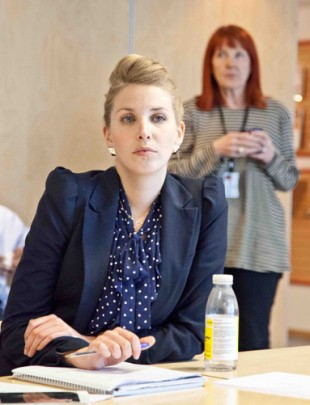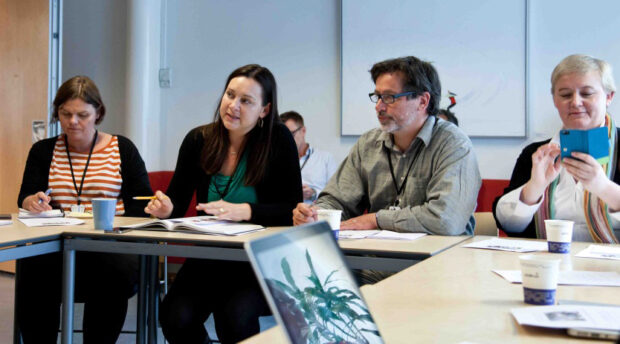
Earlier this month I went to Oslo - Norway's scenic capital - to visit the education team at the Norwegian Agency for Development Cooperation (NORAD). It was to discuss what I've learned about the use (and misuse) of edtech since beginning this work last year.
I also wanted to learn from them what opportunities and challenges they have identified, and how they can best contribute to this field.
Sharing lessons
While DFID still has a lot to do, spending time learning from the evidence has been a key part of my work.
Some of the evidence is unsurprising - technology has most impact when it is integrated into education programs in which teachers and training are central, and when it is used as a tool to help meet a specific learning objective.
Other evidence uncovers more surprising insights; unless programmes that incorporate edtech are specifically designed to reach disadvantaged groups - and many aren’t - those programmes risk exacerbating existing inequalities.
But perhaps my main take-away reflects a wider issue in education and development - access to technology does not equal learning.
Finally, despite the fact that the evidence in this field is often limited and inconclusive, this year has illustrated the critical role research plays in informing our decisions in policy and programming.
'It’s overwhelming'
This is how one NORAD staff member described his feelings towards the complicated world of edtech during our opening meeting. I don't blame him. Bombarded by ideas about whether, how, and when to use edtech and confused by the evidence, (occasionally compelling, often weak), many donors new to this field understandably feel stunned by the sheer volume of information to process and analyse.
This begs a larger question - how should donors like NORAD, who are keen to support the integration of affordable, high-impact technologies, choose which aspects of edtech to focus on? Should it be teacher professional development? Assistive technologies? School management systems? Assessment?
Fortunately, the team at NORAD are motivated and excited by the opportunities edtech presents, and keen to learn from the evidence, test their assumptions and be critical about the most effective ways to use edtech as one tool of many.
More questions than answers

As the morning progressed, we covered a series of key questions, and we all left with more questions than answers. Given the temptation to dub technology THE answer, this has to be a good thing. The main questions which stuck with me were:
- Is interactive pedagogy - interactive teaching and learning methods - necessary for the effective integration of edtech, or does edtech itself create an enabling environment in which these practices can be adopted?
- In all the excitement about the rapidly reducing cost of hardware, how can we raise awareness about total cost of ownership, which is often a more realistic way of understanding the cost-effectiveness of edtech?
- How can the donor community best support multi-stakeholder partnerships that marry commercial and development objectives?
- How can edtech extend access to the most marginalised and avoid exacerbating existing inequalities?
- How can donors support local content creation that is aligned to the national curriculum and led by, and designed for, the partner community?
Needless to say, these questions kept us busy for some time...
Questions to answers?
In the afternoon,I participated in a seminar organised by NORAD which asked us to consider another question: How may ICT in basic education help reach global development goals? I was particularly struck by Ancil Torres’ presentation, 'Promoting assistive technologies for people with disabilities.'
Ancil is the Head of the Torres Foundation for the Blind in Trinidad and Tobago, which specialises in the use of assistive technology for people who are blind or visually impaired. He described ways of increasing access to assistive technologies, which for many people remain prohibitively expensive, by advocating that these tools be available in libraries, schools, universities and work places.
I was also able to share some of the work we are doing to explore the relationship between edtech, teaching and learning, as explained in my last blog post. If you would like to learn more, please click here to listen to a short podcast in which Gry Tina Tinde of NORAD interviews me about DFID’s Topic Guide.
At the end of the day…
In the closing session, we indulged in some soul-searching: Why should donors consider edtech at all?
But as another NORAD staff member put it, the question is not why, but when, and how?
NORAD: thank you for having me and humouring my reflections. Good luck!
Keep in touch. Sign up for email updates from this blog, or follow Rosalind on Twitter.

2 comments
Comment by Nicole posted on
Great post, Ros and I love the photographs. The topic guide on edtech that you have been working on should help in understanding what interventions are backed up by evidence!
Comment by Richard Orme posted on
Thanks for the interesting post. Pleased to see that the session on assistive technologies was so compelling. There is so much potential here, and increasingly the special tools for people with low vision or blindness are free or low cost. As with other domains, we must try harder to make sure that great projects also deliver good evidence on which to build future initiatives.